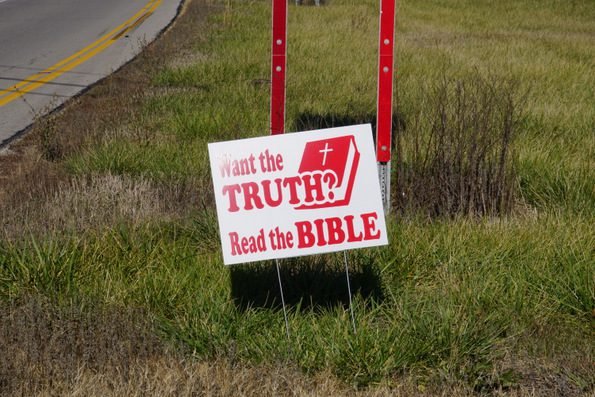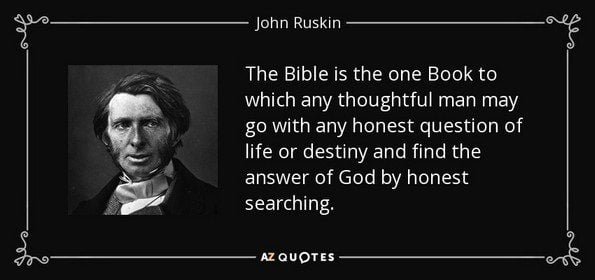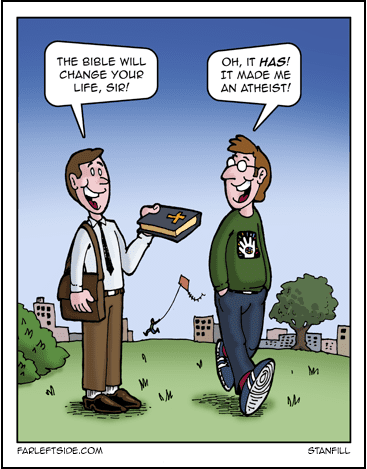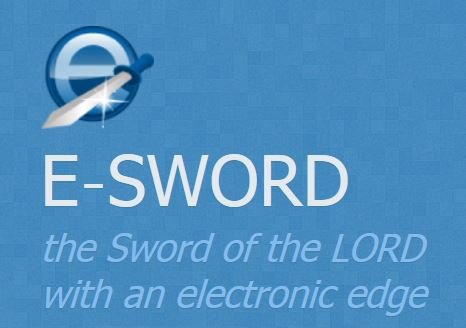
Evangelicals love to talk about the Bible. They call themselves “People of the Book.” Yet, despite all their Bible-loving talk, most Evangelicals are quite ignorant about what the Bible actually says. Why is Biblical ignorance so widespread within Evangelical Christianity? Evangelicals think that by reading the Bible devotionally, they are learning exactly what the Biblical text says and means. Rarely do they read books dealing with textual and historical criticism. If Evangelicals read books besides the Bible, they turn to books that are approved by their denomination, pastor, or church; or they read books that reinforce their beliefs. Evangelicals are far more likely to read Christian self-help books, Christian romance novels, Christian biographies, or superficial “look what God did for me, he’ll do it for you too” books than they are books that deal with doctrine, church history, or textual criticism. I think I can safely say that most Evangelicals have never read a book written by Dr. Bart Ehrman. If pastors and churches sincerely wanted congregants to understand the Bible, you would think that they would encourage them to read the books of the man who has done more than anyone to make the biblical text and early church history accessible to people in the pew. Instead, Evangelicals are often warned to not read Ehrman’s books, lest in doing so, they have doubts about their faith. What pastors are afraid of is that the people in the pew will learn that what they have been telling them from the pulpit about the Bible is not true. Just stick to reading apologetical books written by Evangelical men of God, pastors say. These authors will never lead you astray. Bart Ehrman is an atheist, he can’t be trusted to tell the truth. In taking this approach, pastors teach congregants that if you don’t agree with or like the messenger you can safely ignore his or her message.
I was considered by my ministerial colleagues to be well-read, especially once I moved away from the Independent Fundamentalist Baptist (IFB) church movement. Month by month, my library continued to grow. On more than one occasion, church members came into my office and asked me, Have you really read all these books? I would chuckle a bit and say, yes, I have actually read all of them. While most of the books in my library reinforced my beliefs, as I got older, I began to read authors that were considered heterodox or liberal. Several of my former pastor friends and congregants have said to me that my voracious reading habit was the reason for my loss of faith. One woman told me that what I needed to do was get rid of all my books and just read the Bible. She thought, I’m sure, that the words of the Bible, once read, would have some sort of magical effect on me. Evidently, knowledge was my problem, and if I would just return to the ignorance of faith, all would be well.
Over the years, I met pastors who prided themselves in being men of one book. One man, a Church of the Nazarene pastor, was proud of the fact that his entire library fit on two four-foot shelves. His library consisted of a Strong’s Exhaustive Concordance, Webster’s 1828 Dictionary, several books of illustrations, and a smattering of easy-to-read, pabulum-level books. These kinds of pastors believe that they can just read the Bible and understand exactly what the text says and means. After all, the Holy Spirit lives inside of them. He is their teacher and guide. When they stand in front of their congregations to preach the Word of God, they believe they are doing so as a spirit-filled man of God. Some of the most atrocious sermons I’ve ever heard were preached by men who thought this way.
From 1997-2002, I pastored Our Father’s House in West Unity Ohio. One Sunday evening, three families who knew each other decided to visit our church. After the service, one of the visitors asked me about some of the things I said in my sermon. I told him that I would be glad to loan him several books that I thought would help answer his questions. He replied, I don’t need to read any books, I have the Bible. In his mind, all he needed to understand the text of the Bible was the Bible itself. I wish I could say that his astounding ignorance was rare, but over the years I met countless sincere Christians who had no interest in reading religious books. Some of them rarely read the Bible, let alone anything else. The fact that daily devotional books such as Our Daily Bread are used by churches to encourage congregants to read the Bible speaks volumes. For readers who are not familiar with such materials, let me explain what they are. Our Daily Bread, for example, has a devotional reading for each day of the year. The reading usually contains several Bible verses and an inspirational sermonette, all fitting on a small page. They are like SparkNotes for the Bible. For many Christians, this is the only Bible they will read.
I have known more than a few Evangelicals who, once they have used their Bible during Sunday services, store it under the front seat of their car, in the back window, or the trunk. This way, they will know exactly where their Bible is come next Sunday. One of the reasons pastors repeatedly preach and teach the same basic sermons — four thousand titles for two sermons — is that Bible literacy is quite low among church members. I spent my entire twenty-five years in the ministry trying to get congregants to take Bible reading and study seriously. I can say with great confidence that I failed miserably. This does not mean that these people weren’t good Christians or that they weren’t serious about their faith. Often, thanks to long hours at work or domestic responsibilities, church members had very little time to devote to studying the unsearchable riches of Christ. I, on the other hand, was paid to read and study the Bible. I had hours every day that I could spend pouring over the biblical text and reading dense theological tomes. I used to nag church members about their lack of consistent Bible reading (and praying), but I quit doing so after I realized that the problem was a matter of time, not desire or faith.
Some pastors think that they are so full of the Holy Ghost that they don’t need to study for their sermons. Evangelist Dennis Corle told me that my time could be better spent soulwinning than studying for my sermons. He believed, as many preachers do, that spending time studying was a waste. There are souls to save, these preachers think. I’m just going to trust God, through the Holy Spirit, to tell me what to say. Such preachers reveal for all to see that the Holy Spirit is illiterate. Unlike many of my colleagues, I chose to devote significant time to preparing my sermons. It was not uncommon for me to spend twenty hours a week reading and studying for the sermons I would preach on Sunday. I like to think that my preparation showed in my sermon delivery and knowledge of the biblical text.
As you can see, theological and biblical ignorance is widespread within the Evangelical community. Researchers George Gallup and Jim Castelli pull no punches when they say: “Americans revere the Bible — but, by and large, they don’t read it. And because they don’t read it, they have become a nation of biblical illiterates.” Many Christians can’t name the four Gospels or more than two or three of the disciples. The same can be said for the Ten Commandments. Some of the ignorance can be attributed to the fact that many Evangelical pastors preach what is commonly called “felt needs” sermons; people who gather on Sunday to worship God want to hear uplifting sermons that inspire them to live for Jesus. These overworked, stressed-out children of God want to be told that their lives matter and that God has a purpose and plan for them. They want to hear sermons based on the Bible stories of men and women who were greatly used by God or who wrought great victories in his name. Theological sermons are often met with restlessness and yawns. What congregants want is a Jesus fix, not a seminary lecture.
Many atheists actually know more about the Bible than the people who say they believe that the Good Book is the inspired, inerrant, infallible words of God. One of the reasons that these atheists left Christianity was that they decided to find out exactly what the Bible said. And once they did, they were appalled by what they found. As long as widespread Biblical ignorance continues to infect Christianity, pastors have no need to worry about congregants finding out the truth; the truth being, that what pastors say about the Bible is not true; that the Bible is not in any way a supernatural text; that the Bible is not inerrant, but instead is littered with scores of contradictions and errors. Once Evangelicals realize that they have been duped, they often leave their churches. Many of them remain people of faith, but they no longer trust religious institutions. I have met many disaffected Evangelicals over the past seventeen years. I’ve noticed, given enough time, that they often slowly move towards indifference, agnosticism, atheism, or some sort of generic spirituality. Evangelical leaders are alarmed by the number of Millennials and Generation Z young people who no longer check the “Christian” box on religious surveys. Much has been made about the rise of the Nones. More than a few atheists have wrongly interpreted this rise to mean that some sort of atheist revival is going on. While it is certainly true that atheism in America has grown dramatically over the past twenty-five years, that doesn’t mean that all of the Nones are atheists. Most Nones, in fact, are indifferent towards religion, and if atheists want to win them over to their side, then they are going to have to preach the humanistic gospel. Disaffected young adults are looking for an ethical and moral framework that best represents their beliefs and understandings of the world. Humanism can and does provide such a framework.
I’m optimistic that better days lie ahead for atheism and humanism — that is if Donald Trump doesn’t destroy the world first. Those of us who are humanists need to make the case that humanism provides a rich and full way to live one’s life. We know that the Bible has little to offer our modern society, but with the abandoning of the Bible comes a moral and ethical vacuüm. It’s our duty (and privilege) to present humanism as the way forward, not only for the United States, but the people of the world.
For those who may not know about what I call the humanistic ideal, let me conclude this post with the Humanist Manifesto:
Humanism is a progressive philosophy of life that, without supernaturalism, affirms our ability and responsibility to lead ethical lives of personal fulfillment that aspire to the greater good of humanity.
The lifestance of Humanism—guided by reason, inspired by compassion, and informed by experience—encourages us to live life well and fully. It evolved through the ages and continues to develop through the efforts of thoughtful people who recognize that values and ideals, however carefully wrought, are subject to change as our knowledge and understandings advance.
This document is part of an ongoing effort to manifest in clear and positive terms the conceptual boundaries of Humanism, not what we must believe but a consensus of what we do believe. It is in this sense that we affirm the following:
Knowledge of the world is derived by observation, experimentation, and rational analysis. Humanists find that science is the best method for determining this knowledge as well as for solving problems and developing beneficial technologies. We also recognize the value of new departures in thought, the arts, and inner experience—each subject to analysis by critical intelligence.
Humans are an integral part of nature, the result of unguided evolutionary change. Humanists recognize nature as self-existing. We accept our life as all and enough, distinguishing things as they are from things as we might wish or imagine them to be. We welcome the challenges of the future, and are drawn to and undaunted by the yet to be known.
Ethical values are derived from human need and interest as tested by experience. Humanists ground values in human welfare shaped by human circumstances, interests, and concerns and extended to the global ecosystem and beyond. We are committed to treating each person as having inherent worth and dignity, and to making informed choices in a context of freedom consonant with responsibility.
Life’s fulfillment emerges from individual participation in the service of humane ideals. We aim for our fullest possible development and animate our lives with a deep sense of purpose, finding wonder and awe in the joys and beauties of human existence, its challenges and tragedies, and even in the inevitability and finality of death. Humanists rely on the rich heritage of human culture and the lifestance of Humanism to provide comfort in times of want and encouragement in times of plenty.
Humans are social by nature and find meaning in relationships. Humanists long for and strive toward a world of mutual care and concern, free of cruelty and its consequences, where differences are resolved cooperatively without resorting to violence. The joining of individuality with interdependence enriches our lives, encourages us to enrich the lives of others, and inspires hope of attaining peace, justice, and opportunity for all.
Working to benefit society maximizes individual happiness. Progressive cultures have worked to free humanity from the brutalities of mere survival and to reduce suffering, improve society, and develop global community. We seek to minimize the inequities of circumstance and ability, and we support a just distribution of nature’s resources and the fruits of human effort so that as many as possible can enjoy a good life.
Humanists are concerned for the well being of all, are committed to diversity, and respect those of differing yet humane views. We work to uphold the equal enjoyment of human rights and civil liberties in an open, secular society and maintain it is a civic duty to participate in the democratic process and a planetary duty to protect nature’s integrity, diversity, and beauty in a secure, sustainable manner.
Thus engaged in the flow of life, we aspire to this vision with the informed conviction that humanity has the ability to progress toward its highest ideals. The responsibility for our lives and the kind of world in which we live is ours and ours alone.
Bruce Gerencser, 68, lives in rural Northwest Ohio with his wife of 47 years. He and his wife have six grown children and sixteen grandchildren. Bruce pastored Evangelical churches for twenty-five years in Ohio, Texas, and Michigan. Bruce left the ministry in 2005, and in 2008 he left Christianity. Bruce is now a humanist and an atheist.
Your comments are welcome and appreciated. All first-time comments are moderated. Please read the commenting rules before commenting.
You can email Bruce via the Contact Form.




